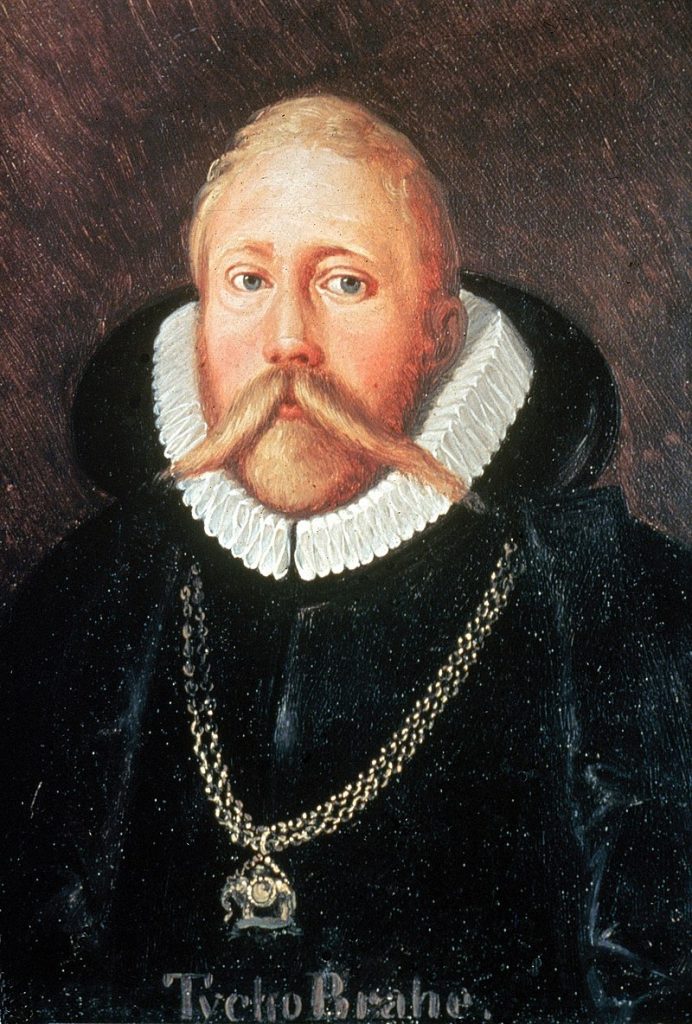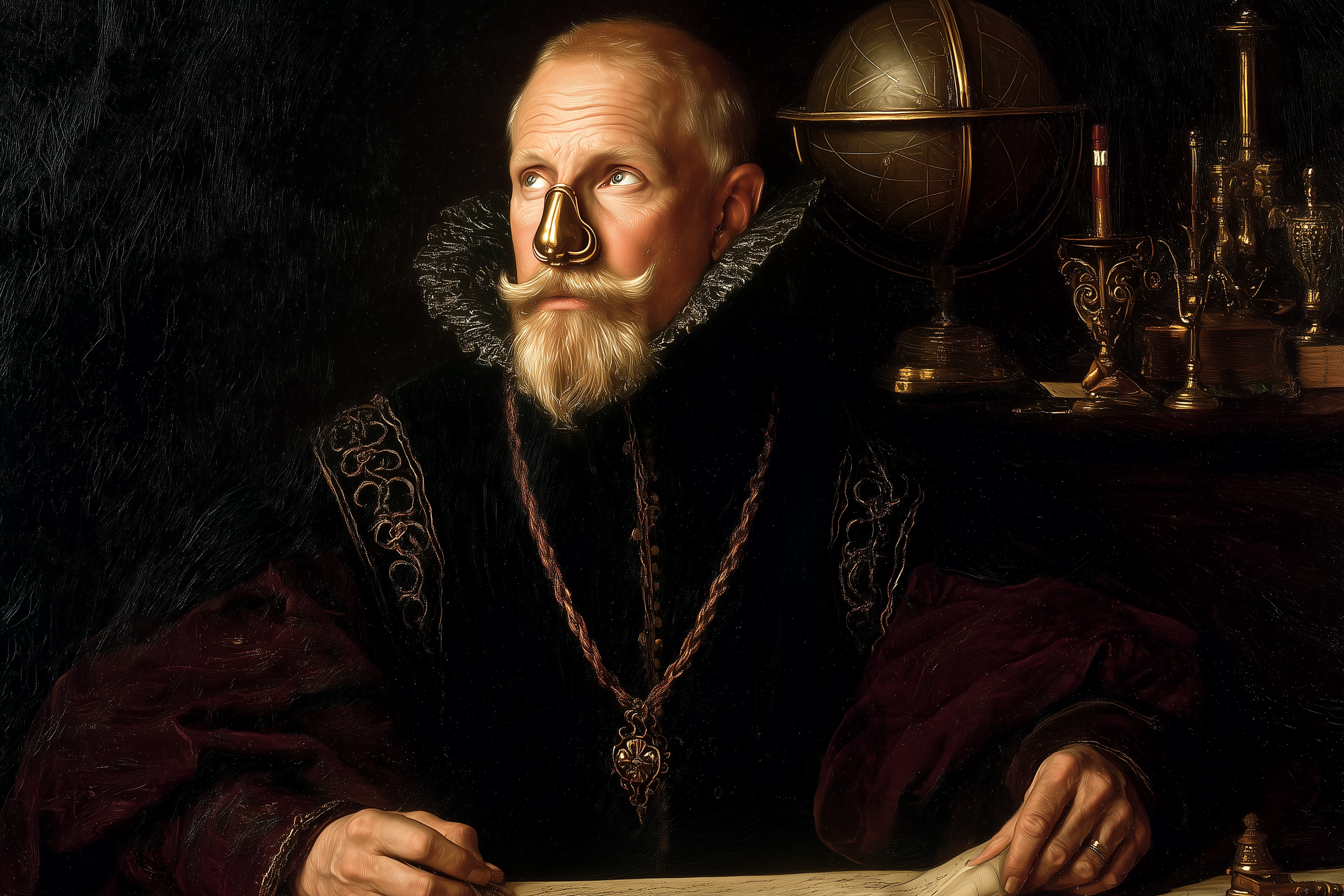Tycho Brahe: The Noble Astronomer Who Charts the Heavens
“Tycho Brahe, the gold-nosed stargazer, mapped the heavens without a telescope—and changed the universe forever!”

- Alias: The Golden-Nosed Astronomer
- Gender: Male
- Race: Human
- Occupation: Nobleman, Astronomer, Alchemist, Imperial Mathematician
- Religion: Honors Máni, the Norse god of the moon, and seeks wisdom through ancient sky-lore passed down by seers and stjarnfræðingar (star-knowers).
- Allies: King Frederick II (former patron), Emperor Rudolf II, Johannes Kepler (complex relationship), trusted assistants at Uraniborg including Jeppe the Desk Dwarf, Otto the Celestial Elk, Various scholars and nobles who support his work
- Enemies: Political rivals at Danish court, jealous scholars, those who challenge his data or authority
- Abode / Base of operations: Uraniborg Observatory (island of Hven); later Prague imperial court
- Nationality: Danish
- Languages: Danish (Common), Latin (Celestial), Ancient Greek (Draconic), Norse (Swedish)
- Alignment: Lawful Neutral (devoted to order and precision, indifferent to chaos or disorder)
- Affiliation(s): Danish nobility, Imperial Court of Prague, Royal Academy of Sciences (de facto)
- Significant Others: None historically confirmed; possibly married to Kirsten or other noblewoman if you want to add depth
Tycho Brahe is a striking figure—tall, noble, and proud, with sharp features and pale eyes that seem always fixed on distant stars. He wears richly embroidered robes decorated with subtle star motifs, and his most famous feature is a gleaming golden prosthetic nose, a reminder of a duel long ago. Tycho carries himself with the certainty of a man who believes the cosmos holds secrets only he can unlock.
His Story
Born into an aristocratic family in Scania, Tycho was raised by his wealthy uncle, who ensured he received a privileged education. As a teenager, a total solar eclipse captivated him, sparking a lifelong fascination with the heavens and the desire to predict their movements.
Tycho studied law and philosophy at various European universities, but his true passion lay in mathematics and astronomy. During his studies, he fought a duel with another nobleman and lost part of his nose. From then on, he wore a prosthetic nose crafted from precious metals.
His fame grew after he observed a new star—a supernova—in the night sky, challenging the long-held belief that the heavens were unchanging. Recognizing his brilliance, the king granted him an island where Tycho built Uraniborg, an advanced observatory outfitted with large, precise instruments he designed himself. There, he spent years meticulously recording planetary motions and star positions with unmatched accuracy.
While influenced by Copernicus, Tycho rejected full heliocentrism. Instead, he devised a geoheliocentric model with Earth at the center, the Sun orbiting Earth, and the planets orbiting the Sun. Though ultimately incorrect, this model was an important step in astronomy’s evolution.
Following the death of his royal patron, political conflicts forced Tycho into exile. He moved to Prague at the emperor’s invitation and became imperial mathematician. His final years were marked by tension with his assistant Johannes Kepler and secrecy surrounding his invaluable data. After a mysterious death, Tycho left his records to Kepler, who used them to revolutionize astronomy.
Character and Motivations
Tycho is meticulous, proud, and sometimes imperious. He obsesses over precision and fears error or obscurity. His noble background gives him a commanding presence and a hunger for lasting recognition. Beneath his confident exterior lies a man determined to impose order on a chaotic universe—believing that through understanding the stars, humanity can find its place and immortality.
His ultimate goal is to map the heavens with unprecedented accuracy, believing this knowledge holds the key to universal truths and his own enduring legacy.
“The Astronomer, the Fool, and the Starborn”
Tycho Brahe 5e
Jeppe the Desk Dwarf 5e
Otto, Celestial Elk 5e
Tycho Brahe

Medium humanoid (human), lawful neutral
Armor Class 15 (astronomer’s robe with arcane threading)
Hit Points 110 (13d8 + 52)
Speed 30 ft.
| STR | DEX | CON | INT | WIS | CHA |
|---|---|---|---|---|---|
| 10 (+0) | 14 (+2) | 18 (+4) | 20 (+5) | 16 (+3) | 14 (+2) |
Saving Throws Int +9, Wis +7
Skills Arcana +11, History +9, Insight +7, Investigation +9, Perception +7
Tools Astrolabe, cartographer’s tools, alchemist’s supplies
Languages Danish (Common), Latin (Celestial), Ancient Greek (Draconic), Old Norse
Proficiency Bonus +4
Challenge 8 (3,900 XP)
Background Sage (Astronomer)
Astronomical Features
Master of the Heavens (1/Day).
Under a clear night sky, Tycho can spend 1 minute consulting the stars. He then gains one of the following benefits for 24 hours (his choice):
- Allies within 30 ft. gain a +1 bonus on saving throws against fear and charm.
- Tycho gains advantage on Intelligence (Arcana) and Wisdom (Insight) checks.
- He divines the direction and approximate distance to the nearest extraplanar rift or celestial anomaly.
Golden-Nosed Seer (3/Day).
Tycho’s enchanted prosthetic nose, forged of arcane alloy, pulses with ethereal resonance. As a bonus action, he gains the ability to see invisible and ethereal creatures within 30 feet until the end of his next turn.
Stellar Conjunction (Recharge 5–6).
Tycho invokes a precise stellar alignment memorized from his celestial charts. Up to three creatures of his choice within 60 feet must succeed on a DC 17 Intelligence saving throw or become mentally disrupted—subtracting 1d6 from their next attack roll or ability check.
This effect is nonmagical but supernatural in origin, bypassing magic resistance.
Cosmic Precision (5/Day).
When Tycho or a creature within 10 feet makes an Intelligence or Wisdom check, attack roll, or saving throw, Tycho can add 1d4 to the result. He regains all uses after a long rest.
Spellcasting
Tycho is a 9th-level spellcaster. His spellcasting ability is Intelligence (spell save DC 17, +9 to hit with spell attacks). He uses an astrolabe or star map as his arcane focus.
Cantrips (at will): Mage Hand, Message, Light, Guidance
1st level (4 slots): Shield, Detect Magic, Identify
2nd level (3 slots): Augury, Mirror Image, Locate Object
3rd level (3 slots): Sending, Nondetection, Counterspell
4th level (3 slots): Divination, Arcane Eye
5th level (2 slots): Legend Lore, Scrying
Legendary Actions
Tycho can take 2 legendary actions, choosing from the options below. Only one legendary action can be used at a time and only at the end of another creature’s turn. Tycho regains spent legendary actions at the start of his turn.
- Observe the Heavens. Tycho rolls a d6. On a 5 or 6, he regains the use of Stellar Conjunction.
- Redirect Energy. When targeted by a spell, Tycho diverts the effect to another creature of his choice within 10 feet. The new target must be a valid target for the spell.
- Insightful Revelation. Tycho grants a creature within 30 feet advantage on its next saving throw before the start of its next turn.
Equipment
- Golden Nose of Ethereal Sight (wondrous item, rare): Grants true sight (30 ft.) for 1 round, 3/day.
- Celestial Atlas of Uraniborg (wondrous item, very rare): Grants +2 bonus to Arcana checks related to stars, planes, and time.
- Ring of Lunar Timing (wondrous item, uncommon): Allows casting Divination as a reaction once per long rest when under moonlight.
Eccentric Habits & Companions
Arcane Libations.
Tycho regularly drinks strange alchemical spirits he distills himself. He is immune to the poisoned condition and cannot become intoxicated by nonmagical alcohol. He has advantage on saving throws against poison.
Otto, Celestial Elk.
Tycho is accompanied by a tamed, semi-magical moose named Otto. Treated as a giant elk, Otto is unusually intelligent (Int 6) and understands Common. Otto is peaceful, follows Tycho loyally, and will defend him if harmed. He is fond of wine and will drink unattended cups if left alone.
Jeppe the Desk Dwarf.
A sharp-tongued, caustically insightful dwarf lives under Tycho’s desk. Jeppe insults guests, heckles nobles, and offers eerily accurate predictions between jokes. Once per day, he grants a creature a reroll on a d20 roll—but only if they earn his favor (usually by laughing at themselves, outwitting him, or giving him strong drink). Jeppe speaks Common, Old Norse, and Celestial, often switching mid-sentence.
Roleplaying Tycho Brahe
Tycho Brahe is brilliant, proud, and theatrically eccentric. He holds court beneath the stars in long embroidered robes, drinks potent concoctions of his own design, and consults celestial charts for every decision. His golden nose gleams with arcane power. A tamed moose frequently trails him through cities and observatories alike, while Jeppe, the razor-tongued dwarf under his desk, appears to finish Tycho’s thoughts before he speaks them.
He views the cosmos as a machine of grand design, and himself as one of its few true interpreters. He is not a warrior, but the knowledge he wields can halt wars—or start them.
Adventure Hooks
- The Falling Star. A meteorite tied to Tycho’s celestial maps crashes in a remote wilderness. Tycho hires adventurers to retrieve it before rival factions do.
- The Starlock Rift. A rare celestial event threatens to rupture planar boundaries unless Tycho’s ancient orrery is realigned in time.
- The Moose Runs Loose. Otto becomes cursed by extraplanar influence and begins behaving erratically. Tycho begs the party to help restore his beloved elk before things get worse.
- Jeppe’s Secret. The dwarf under Tycho’s desk may be more than he seems—perhaps a bound spirit, a demigod, or an unwilling prisoner with secrets of cosmic importance.
Jeppe the Desk Dwarf

Small humanoid (dwarf), chaotic neutral
Armor Class 13 (natural agility)
Hit Points 27 (6d6 + 6)
Speed 25 ft.
| STR | DEX | CON | INT | WIS | CHA |
|---|---|---|---|---|---|
| 8 (–1) | 16 (+3) | 12 (+1) | 14 (+2) | 15 (+2) | 16 (+3) |
Saving Throws Dex +5, Cha +5
Skills Insight +5, Perception +4, Deception +6, Sleight of Hand +5, Stealth +5
Languages Danish (Common), Latin (Celestial), Ancient Greek (Draconic), Old Norse
Challenge 2 (450 XP)
Traits
Darkvision.
Jeppe can see in dim light within 60 feet as if it were bright light, and in darkness as if it were dim light.
Dwarven Resilience.
Jeppe has advantage on saving throws against poison, and he has resistance against poison damage.
Fey Ancestry.
Jeppe has advantage on saving throws against being charmed, and magic can’t put him to sleep.
Sharp Tongue.
Jeppe can use a bonus action to deliver a biting verbal jab to one creature he can see within 30 feet. The target must succeed on a DC 13 Wisdom saving throw or have disadvantage on its next attack roll or ability check. Jeppe can use this feature 3 times per day.
Prophetic Wit.
Jeppe can grant a creature he can see within 30 feet a reroll on a d20 roll of their choice (attack roll, saving throw, or ability check). This must be declared before the outcome is known. Jeppe regains this ability after a long rest.
Small and Nimble.
Jeppe can move through the space of any creature that is of a size larger than him.
Spellcasting
Jeppe is a 3rd-level spellcaster. His spellcasting ability is Charisma (spell save DC 13, +5 to hit with spell attacks). He has the following spells prepared:
- Cantrips (at will): Minor Illusion, Prestidigitation
- 1st level (3 slots): Disguise Self, Charm Person
- 2nd level (2 slots): Detect Thoughts, Mirror Image
Actions
Mocking Taunt.
Ranged Spell Attack: +5 to hit, range 30 ft., one target.
Hit: 1d6 + 3 psychic damage, and the target must succeed on a DC 13 Wisdom saving throw or be distracted, granting advantage on the next attack roll against it before the end of Jeppe’s next turn.
Dagger.
Melee Weapon Attack: +5 to hit, reach 5 ft., one target.
Hit: 1d4 + 3 piercing damage.
Roleplaying Notes
Jeppe is a sharp-tongued dwarf who lives beneath Tycho’s desk. His biting wit and prophetic insights unsettle even nobles. His magic aids his mischievous nature, allowing him to confuse and charm those around him. Despite his size, he carries an air of commanding mischief and uncanny foresight.
Otto, Celestial Elk

Large beast, unaligned
Armor Class 14 (natural armor)
Hit Points 68 (8d10 + 24)
Speed 50 ft.
| STR | DEX | CON | INT | WIS | CHA |
|---|---|---|---|---|---|
| 19 (+4) | 14 (+2) | 16 (+3) | 6 (–2) | 14 (+2) | 10 (+0) |
Saving Throws Dex +4, Wis +4
Skills Perception +4, Survival +4
Damage Resistances radiant
Senses darkvision 60 ft., passive Perception 14
Languages understands Common but cannot speak
Challenge 3 (700 XP)
Traits
Celestial Resilience. Otto has resistance to radiant damage. If Otto takes radiant damage, he can use his reaction to heal 10 hit points.
Sure-Footed. Otto has advantage on Dexterity (Acrobatics) checks and Strength (Athletics) checks made to maintain footing or balance.
Loyal Companion. Otto understands Common and follows simple commands from Tycho Brahe without hesitation.
Actions
Hooves.
Melee Weapon Attack: +6 to hit, reach 5 ft., one target.
Hit: 2d6 + 4 bludgeoning damage.
Celestial Charge (Recharge 5–6).
If Otto moves at least 20 feet straight toward a target and hits with a hooves attack on the same turn, the target takes an extra 2d8 radiant damage and must succeed on a DC 14 Strength saving throw or be knocked prone.
Roleplaying Notes
Otto is a majestic and intelligent elk with faint celestial markings glowing softly on his fur. He’s loyal and calm but can become fiercely protective of Tycho. Otto enjoys quiet moments, especially near moonlight or starlight, and has a fondness for wine, often attempting to drink unattended cups.
I. Hven — The Island Observatory

Overview
A secluded island sanctuary nestled in a temperamental northern sea, Hven is both an impregnable fortress and a radiant laboratory. This haven of eccentric genius is a confluence of scientific inquiry, divine observation, and arcane innovation. Once considered the most advanced research outpost on the material plane, Hven now serves as a hub of extraplanar connections, bridging the realms of reason and wonder. It is an island caught between reality and the mythic skies—part bastion of learning, part mystical anomaly.
Terrain & Features
- Chalk Cliffs: Towering, sheer alabaster walls encircle much of the coastline. Guard posts, telescope alcoves, and enchanted teleport circles are carved directly into the cliffside stone. From above, the cliffs catch starlight and shimmer faintly at night, acting as a celestial mirror.
- Pine Forests: Wind-warped groves thick with glowing mosses, home to bio-luminescent fungi and mechanical wildlife. Golemic creatures skitter between trees, tending to arcane weather stations and ethereal beacons. Forests occasionally emit harmonic tones as ley lines shift beneath the soil.
- Wildflower Meadows: Bursting with radiant alchemical flora. These meadows are tended by insect-sized golems and celestial bees that harvest pollen infused with moonlight. Students study their chromatic bloom cycles and gather dream-petals for divination rituals.
- The Lunar Garden: A gravity-defying arboretum, its floating stones and shimmering trees orbit a core of lunar magic. Night-blooming flowers open only under full moons, their petals dripping with astral dew. The garden is often a site of meditation and planar alignment ceremonies.
- Ruins of the Old Chapel: A broken temple devoted to forgotten cosmic entities. Its stained glass windows hum with psionic energy, displaying shifting constellations when no one watches. Ghostly whispers sometimes echo from the crypt beneath.
Uraniborg Observatory
- Exterior: A towering, hexagonal complex of brass domes, rotating lenses, spiraled minarets, and a radiant beacon pulsing with astral energy. Golden sundials and celestial engravings adorn its stonework, and hovering sigils drift through the air like snow.
- Grand Orrery Hall: The heart of the observatory, containing a levitating, mechanical model of the cosmos. The orrery updates in real time, echoing both known stars and those not yet born. Visiting planar scholars leave offerings on its outer rings.
- Tycho’s Study: Cluttered with scrolls, charts, star maps, and animated automatons. The room is alive with movement: glowing diagrams hover midair, and Jeppe the Desk Dwarf throws insults from beneath the desk. A time-lost raven sometimes delivers cryptic missives.
- The Stellar Forge: A blazing forge powered by a fragment of a star. Here, divine alloys are smelted and constructs are forged with magical precision. Apprentice smiths chant equations in harmony with the forge’s pulsating rhythm.
- The Red Room: A deep, secure chamber housing stores of enchanted ales and divine spirits. Otto the Celestial Elk often attempts to break in, usually successfully. The room is protected by ale-elementals and spirit-warding runes.
- Roof Decks: Outfitted with mounted telescopes, divine weather vanes, and mirror arrays for scrying. Some launch small craft and gliders into the sky. During eclipses, rituals are performed here to commune with extraplanar entities.
Stjerneborg Substructure
- Chrono-Loom Chamber: A vast, gear-driven observatory that calculates timelines and divines future astronomical events. It predicts celestial conjunctions with unnerving accuracy. The chamber hums with the ticking of multidimensional time.
- Underground Archives: Vaults of forbidden tomes, star charts, and extraplanar bestiaries. Guarded by animated parchments and mechanical spiders. Some scrolls whisper forbidden truths when unrolled.
- Celestial Ale Cellar: A mystical brewery and vault that produces unpredictable magical brews. Drinking them might grant visions, teleportation, or sudden enlightenment. Otto frequently causes chaos here.
- Zodiac Golem Hall: A ring of 12 alcoves, each housing a sentient golem reflecting a sign of the zodiac. Each construct responds to its element and phase of the moon. They also host debates under Tycho’s moderation.
- Servitor Workshop: Home to the island’s mechanical workforce. Astrolabe Servitors recharge in luminous ether pools and undergo repairs by enchanted tools. Artificer students maintain the complex under watchful guidance.
Magical Atmosphere
- Gravity behaves in unusual ways, allowing leaps twice as far and high.
- Nights extend longer than normal, filled with stars that pulse and drift.
- Weekly celestial events—cometfalls, auroral displays, sky tears—mark the heavens.
- Arcane mechanisms function with greater efficiency and rare misfires.
- Visitors sometimes experience flashes of lives in alternate timelines or dreamscapes.
II. Key Inhabitants
Tycho Brahe
- Race: Human
- Role: Sage, Inventor, Navigator of Divine Laws
- Traits: Gold prosthetic nose fastened with arcane clamps, flamboyant velvet robes stitched with constellations, constantly consulting animated star charts, engages in nightly philosophical debates with constructs
Jeppe, the Desk Dwarf
- Race: Dwarf
- Role: Irreverent familiar, caustic adviser, master scribe
- Traits: Lives under Tycho’s desk in a scroll nest; offers vicious mockery in dozens of languages. Secretly catalogs every mistake made by Tycho and others. Maintains a gossip scroll network with other magical assistants across the planes.
Otto, the Celestial Elk
- Type: Celestial Beast (Unique)
- Traits: Towering with antlers that hum with starlight; uses moonbeams to teleport; addicted to divine ale
- Complication: Frequently steals beer from the Red Room. Known to give drunken prophetic utterances. Feared by constructs. Sometimes seen leading student-led revels on starlit meadows.
Constructs and Servitors
- Astrolabe Servitors: Cat-sized mechanical assistants that speak in chimes and orbit their users like moons
- Zodiac Golems: Twelve radiant constructs—one for each zodiac sign—each animated with elemental cores
- Spigot the Ale Automaton: A semi-sentient beer dispenser who debates philosophy in between pouring enchanted brews
- Stellar Forge Golem: A massive construct tasked with operating the Stellar Forge and maintaining security
- Clockwork Owls: Serve as messengers and observation recorders, able to replay conversations in holographic detail
III. The Urania Magnus (Spelljammer Ship)

A crescent-shaped divine observatory-ship that sails the Astral Sea, powered by logic, mathematics, and captured starlight. Its hull gleams like frozen moonlight, and its wings unfold as radiant veils of energy. Designed to be both a mobile observatory and diplomatic embassy to planar powers.
Spelljammer Ship Statblock (5e 2024 Style)
Name: Urania Magnus
Size: Gargantuan
Creature Capacity: 12 (crew), 30 (passengers)
Cargo Capacity: 20 tons
Travel Speed (Wildspace): 100 million miles/day
Travel Speed (Atmosphere): 8 mph (hover-capable)
Armor & Hull
- AC: 18 (Meteoric Iron Plating)
- Hit Points: 500 (Damage Threshold: 20)
- Hull Composition: Reinforced core from a fallen star, plated with lunar crystal and meteoric alloys
Movement & Power
- Helm Type: Chrono-Engine (custom design by Tycho)
- Pilot Ability Score Used: Intelligence (Arcana) or Wisdom (Astrology)
- Special Movement: “Celestial Drift” — 1/day, the vessel blinks through constellations, reappearing anywhere in the current plane (Plane Shift effect)
Armaments
- Astral Lance (x2)
- Range: 1200 ft
- Hit Bonus: +9
- Damage: 8d10 radiant
- Zodiac Golem Bay
- Function: Launches 1d4 Zodiac Golems (CR 4 each) into battle once per long rest
Features
- Orrery Bridge: Navigation is achieved by stepping into a floating model of the solar system. Moving planets adjust helm orientation.
- Gravity Modulator: Ensures stable gravity in all ship sections, even during Astral transitions
- Divine Sails: Brass frameworks stretch radiant, living energy wings to catch starlight winds
- Chrono-Loom Relay: Offers predictive glimpses of future outcomes, granting advantage on initiative and navigation checks
- Stellar Vault: A secure, pocket-dimension cargo hold that stores arcane samples, forbidden texts, and Otto’s beer hoard
- Philosopher’s Galley: The kitchen/laboratory where sustenance is synthesized from philosophical ideals and moonberries
Legendary Actions (Ship)
The Urania Magnus can take 2 legendary actions per round, choosing from the options below. Only one option may be used at a time and only at the end of another creature’s turn. Legendary actions refresh at the start of each of the ship’s turns.
- Starburst Array (Recharge 5–6): Releases a solar flare. All enemies within 60 ft must make a DC 17 Dexterity save or take 4d12 radiant damage.
- Cosmic Alignment: Until the end of the next round, the ship gains +2 AC and attackers roll at disadvantage
- Deploy Servitor: Launches an Astrolabe Servitor to aid a crew member or execute a mechanical task, granting +2 to their next action
IV. Students and Assistants
Overview
Tycho Brahe does not work alone. The halls and observatories of Uraniborg are alive with students, scribes, and magical assistants, each drawn from across the realms by Tycho’s celestial reputation. They represent a confluence of intellect, ambition, and the arcane—each with a unique voice and role in the greater machinery of discovery. Visitors often describe Uraniborg as a “living university,” where discovery is as common as tea breaks and stargazing.
Roles and Duties
- Astrological Apprentices: Study omens in the stars, interpret cosmic patterns, and assist Tycho in refining predictive models.
- Arcano-Mechanical Interns: Responsible for tuning the constructs, maintaining magical interfaces, and overseeing the synchronization of the observatory’s rotating domes.
- Alchemical Students: Experiment in the lower laboratories with lunar tinctures, star-forged alloys, and elemental infusions.
- Chrono-Cartographers: Apprentice mages trained in temporal mapping, they chart constellations through time rather than space.
- Transplanar Scribes: Maintain correspondence with extraplanar academics, document phenomena, and translate ancient star-tongue scrolls.
- Mythogeographers: Students of planar topography who map mythic space, aiding in the navigation of dreamscapes and divine territories.
Notable Students
- Elira Varn (Half-Elf, Diviner Wizard 5): A quiet prodigy who reads starlight through prisms. Gifted in predicting momentary futures with eerie accuracy.
- Galen of Iridess (Human, Artificer 4): A cheerful tinkerer responsible for building the moonstone prism array. Frequently blown backwards in experiments.
- Torrik Underbow (Gnome, Cleric of the Knowledge Domain 3): Assigned to monitor divine anomalies in celestial movement. Also brews strong tea.
- Selsa, Inkborn Homunculus (Construct): A magically animated assistant with an encyclopedic memory of stellar events. Scribbles maps with eight quills at once. Occasionally hosts debates on the ethical treatment of familiars.
Daily Life at Uraniborg
- Morning begins with a cosmic alignment check at the Grand Orrery.
- Midday shifts involve lab rotations, observation posts, and golem maintenance.
- Evenings are spent in lecture halls under Tycho’s instruction or in spirited debates moderated by Jeppe.
- Students often race to the roof during auroral events or when Otto causes a disruption in the Red Room.
- Weekly symposiums showcase discoveries, experiments, and sometimes accidents involving beer golems.
Reputation and Influence
Graduates of Uraniborg are respected across the multiverse. Most go on to become court astronomers, planar navigators, or founders of their own arcane schools. Despite the occasional magical mishap (or ale-induced elk chase), Tycho’s mentorship is considered a rare honor among scholars and adventurers alike. Their robes, stitched with a unique constellation, are recognized in royal courts, mage colleges, and adventuring companies alike.

 Buy me a coffee
Buy me a coffee